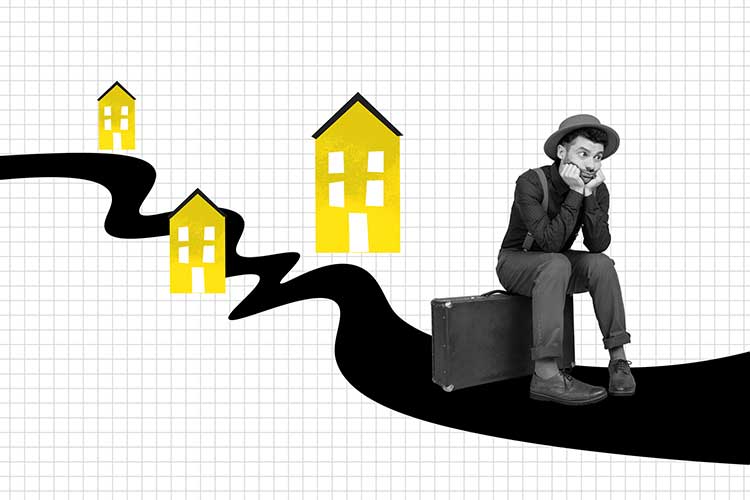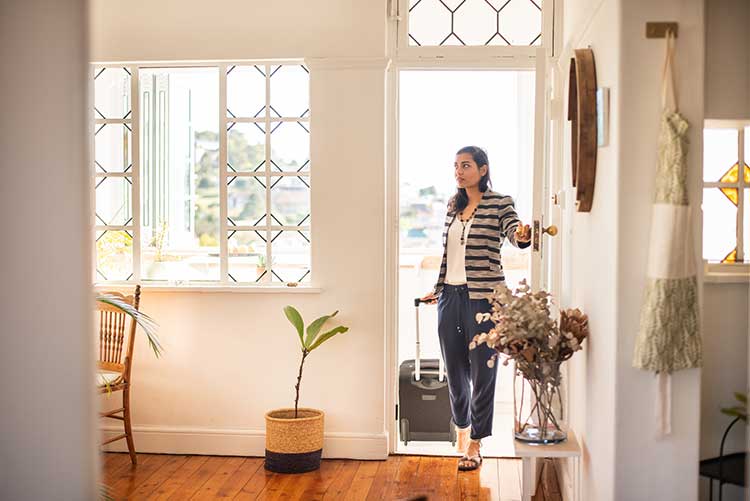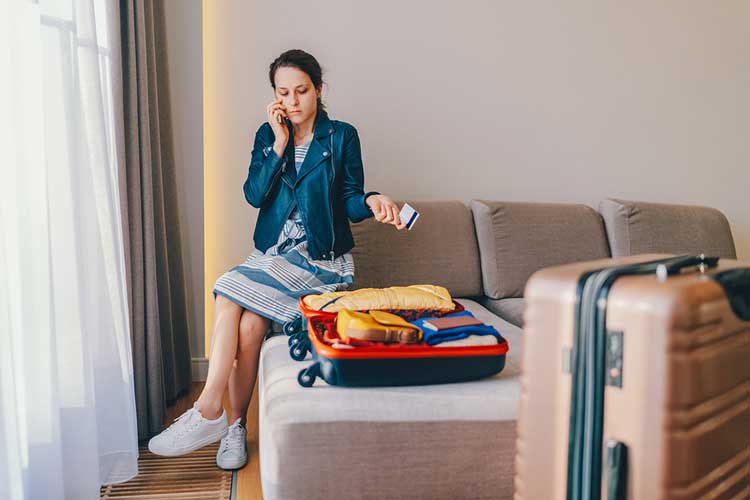Last updated November 2025
Avoid a Vacation Rental Nightmare
Our Investigation Found Widespread Problems, Including Fake Listings and Stolen Deposits; Many Victims Get Little Help from Booking.com or Vrbo

In December 2024, Eric Atkins thought he’d found the perfect rental on Booking.com for his family’s vacation to Venice, Italy. The listing included photos of a spacious, well-appointed apartment, positive reviews from previous guests, an ideal location, and—at $1,194 for five nights—seemed affordable. Atkins reserved it, and because his trip was less than a month away, was required to pay in full upfront.
Unfortunately, the apartment didn’t exist. Scammers had created a fake listing, posted it on Booking.com, collected Atkins’ money, and disappeared. After receiving complaints from other customers, Booking.com removed the listing and canceled the reservation, but didn’t issue Atkins a refund.
Booking.com proposed a replacement: A hostel-like property that Atkins decided wouldn’t work for his family of five. After further back-and-forth with the company’s customer service reps he used the website to reserve and pay for a second, more expensive apartment, having been told that a refund for his first reservation would be processed promptly. Now, nearly one year later, after dozens of phone calls and messages, Atkins still hasn’t gotten back his stolen money.
While millions of travelers use vacation rental sites to book successful stays, Atkins’ experience mirrors those of thousands of others found during a Consumers’ Checkbook investigation of problems with vacation rentals.
Our interviews with victims, analysis of complaints filed with the Better Business Bureau (BBB), and feedback from customer reviews about properties hosted by Booking.com and Vrbo uncovered a disturbingly common problem: Travelers book stays; hosts collect full or partial payments and then cancel reservations or stop communicating with customers. Sometimes, guests arrive to discover that the real owners or residents have no idea their properties’ addresses are listed on vacation rental websites.
Theft of customer deposits is also common on Booking.com and Vrbo. Hosts of legitimate properties often refuse to return deposits even when guests cancel during the allowable window. Or they pocket hefty damage deposits without any explanation.
Airbnb also racks up thousands of complaints per year with the BBB. But because it handles payments differently than Booking.com and Vrbo, we found it was far more likely to issue refunds and has more systems in place to prevent abuse. While travelers might still experience dirty bathrooms and noisy neighborhoods, Airbnb at least readily returns money lost to scammers—and promptly shuts down fraudulent listings.
But customers of Booking.com and Vrbo who lose money to scams and other obviously abusive hosts often receive little or no help to recover their funds. Despite complaints about even obvious fraud, some problem properties persist on these websites for years.
“I just feel extremely victimized, both by the fraudster, of course, but also by Booking.com. Completely abandoned; completely shut out and ignored,” Atkins said. “I’ve spent months trying to get a refund and still have nothing. They appear to just not care.”
Booking.com and Vrbo Explicitly Deny Responsibility for Even Obvious Fraud
Vrbo trumpets its “Book with Confidence Guarantee,” saying its protection kicks in if you reserve and pay through its website and incur a covered loss (such as “internet fraud,” “wrongful denial of entry,” “material misrepresentation,” or “wrongful deposit loss”).
But dig into its 10,500-word “Terms of Service” and you’ll find that Vrbo explicitly disclaims responsibility for problems its customers encounter: “We provide our Service to you only as a venue allowing you to view listings of, and obtain information about, properties offered for rent.” And: “We are not obliged to mediate between a Guest and a Travel Provider in any dispute arising between them.”
Susan Chudd learned the hard way that Vrbo sees itself as simply an advertising tool, not a travel provider that guarantees good results. And sometimes it advertises fake rentals set up by scammers.
In September 2024, Chudd rented a large estate in Richmond, Ky., via Vrbo for a family reunion for 22 people. The listing boasted more than a dozen bedrooms and bathrooms plus a large pool. Chudd booked it for seven nights in June 2025 for a total cost of $7,115, including Vrbo’s $781 “Service Fee” and $551 for optional “Trip Protection.”
Chudd’s credit card was charged immediately for the total. Then, about two months before the reunion, she received an email from The Farm, LLC, the company managing the property. It said that her reservation was canceled because Vrbo had “deplatformed” the company and that Chudd should contact Vrbo for a refund. She called Vrbo and was told to seek a chargeback from her credit card company.
Chudd got her money back, but only because she paid via credit card. Others who booked stays at properties managed by The Farm, LLC, weren’t so lucky. Many paid by debit card or bank draft, and still haven’t received refunds.
That’s what happened to Atkins. When booking the scam Venetian listing, he noticed that the hosts only took payment via bank transfer. An internet search confirmed this is common for international stays; he was also reassured because the flat was listed on Booking.com, the world’s largest travel-booking website. After he lost his money, he sought help from his bank, USAA, but was told that he had insufficient evidence of wire fraud and wasn’t covered by the bank’s fraud resolution program.
Booking.com similarly disavows any responsibility for even obvious problems, including when scammers use its website to defraud customers. Its “Customer terms of service” web page, which stretches for more than 16,000 words, states: “When you make (or request) a booking, it’s directly with the Service Provider—we’re not a ‘contractual party.’”
Booking.com also denies any responsibility for inaccurate listings: “We do not warrant or make any representations regarding the suitability, availability, accuracy, reliability, or timeliness of any material of any kind on the website for any purpose… You agree that you will make use of the Booking.com website and services at your own risk. You understand and agree that we are not responsible or liable for any misuse or unauthorized use of our website or services, or any consequences arising out of such misuse or unauthorized use.”
Booking.com and Vrbo claim that fraudulent listings are rare. But within just a few hours our researchers spotted more than 50 obviously fake properties on each website simply by asking Google to search for listings with customer reviews that included words like “scam,” “fake,” or “doesn’t exist.”
Common complaints within those reviews: Travelers booked stays, paid deposits, and lost money to scammers who set up fake listings, or customers booked with hosts who refused to return deposits for cancellations within their “full refund” timeframe. Many customers lamented that Booking.com and Vrbo offered little assistance and no refunds.
We also reviewed thousands of consumer complaints filed with the BBB. As of November 2025, it had received 7,597 complaints over three years for Airbnb, 4,697 for Booking.com, and 3,123 for Vrbo. Many customers said that they asked Booking.com and Vrbo for refunds but didn’t get them, even after several months of asking.
Thousands more complain to the BBB each year about specific property managers. Its page for The Farm, LLC, the company that stole more than $7,000 from Chudd, reports an F rating and 50 complaints stretching back to 2023; nearly all report that the company took deposits and then canceled stays but wouldn’t issue refunds. Several people who lost money to The Farm report they asked Vrbo for help but didn’t get it—or their money back.

Where’s My Money?!
Airbnb, Booking.com, and Vrbo urge users to pay hosts only within their websites or apps. They claim this protects consumers from fraud. But does it?
Most vacation rental hosts require large upfront deposits—typically 50 percent at booking and the remainder 30 to 60 days before check-in. Because of the way they handle payments, for Booking.com and Vrbo this arrangement can enable abuse, since scammers and bad actors can get paid for all or most of the total and walk away. Victims then ask the websites for relief, only to be told that Booking.com or Vrbo are just “forums” and weren’t ever part of any transaction.
Airbnb’s business and payment policies provide far stronger protections from abuse. Hosts can still require large deposits or even full payment far in advance, but Airbnb doesn’t release any funds to them until about 24 hours after guests check in. This is critical: It means if a customer falls victim to a scam, can’t access a property, or discovers their rental is unsafe or filthy, Airbnb still has their money and can issue a full refund. And we found that it often does that so long as customers can prove fraud or other serious problems.
Airbnb’s terms and conditions guarantee full refunds to customers if “Host cancels the reservation prior to check-in”; “Host fails to provide their guest access to the accommodations”; “Accommodations are significantly different than advertised”; or “Accommodations are not habitable at check-in,” including a bevy of unsanitary or unsafe conditions. Also: “If a host cancels a reservation or another Reservation Issue disrupts a guest’s stay, the host will receive no payout or will have their payout reduced by the amount refunded to their guest.”
Also, unlike Booking.com and Vrbo, Airbnb has a “Major Disruptive Events” policy, which states it will refund guests if they have to cancel due to unforeseen circumstances like weather events or war.
Because Booking.com and Vrbo explicitly deny responsibility for most problems, and because they let hosts handle payments, their websites are ripe for scammers.
In July 2024, Emil Tokaev used Booking.com to reserve an apartment in Marina del Rey, Calif., for his father, who was visiting him for a week. The listing featured a perfect score (“Wonderful 10.0”) based on four stellar reviews. He was charged $2,277.
The apartment didn’t exist. On check-in day, the host messaged Tokaev that the rental wouldn’t be available at the 4 p.m. check-in time; later he was told it wouldn’t be available until after 10 p.m. Finally, the host stopped communicating altogether. After multiple calls to Booking.com, at 1 a.m. a representative finally steered Tokaev to a nearby hotel where he could book and pay for a room, but assured him that “The original reservation will be canceled at no cost. If you have prepaid for it, you should receive a full refund within 14 days.”
That didn’t happen. Over the course of more than a year, Tokaev has made several phone calls and sent dozens of messages to Booking.com. So far, all Tokaev has received is a $100 credit toward future travel.
Tokaev tried to recover his lost money by suing Booking.com in a U.S. small claims court. But that effort was stalled because Booking.com is technically headquartered in the Netherlands. Tokaev is now trying to sue Booking.com there. At the time of this writing, that case was still pending.
After Chudd’s vacation rental was canceled, Vrbo initially told her to ask The Farm, LLC, for a refund. When she contacted The Farm, she received an email form asking for her checking account details. The form bizarrely promised to send her refunds in equal installments over eight months. Chudd did not fill out the form; if she had, we worry they might have drained her account.

Problem Properties Persist, Sometimes for Years
We couldn’t determine how many fraudulent listings appear on these websites, or how much money consumers lose each year to such scams. We asked Airbnb, Booking.com, and Vrbo how many fake listings each company identifies and removes each year, but none would tell us.
In its early years, Airbnb hosted so many bogus listings that, in 2017, the company admitted fake properties were slipping through the cracks. The problem hasn’t gone away: Airbnb reps told the Associated Press that in 2023 it had removed 59,000 fake listings and blocked another 157,000 before they went live.
All three companies do require that prospective hosts provide scans of government-issued IDs and take other steps to weed out obvious attempts to set up fake listings. Airbnb makes all users—hosts and guests—complete its identity verification process. Most importantly, Airbnb clearly kicks out problematic hosts quickly—we could unearth very few complaints about fraud via guest reviews. For a short time, Airbnb did list properties managed by The Farm, LLC, under Granite State Collection, its new business entity, but those listings were removed after a few weeks.
Booking.com and Vrbo, on the other hand, don’t always act quickly to remove problem listings.
According to Tokaev, the fake listing he paid for remained on Booking.com for several months after the incident. Many of the dozens of faux properties our researchers uncovered were still active on Booking.com and Vrbo when we checked back months later.
When we asked Vrbo to comment on Chudd’s experience, its spokesperson noted that the company didn’t consider the listing as fraudulent: “Her reservation with The Farm, LLC was a legitimate booking before the account got suspended, and we were glad she got a full refund via chargeback.”
In November 2024, Vrbo removed all the properties managed by The Farm, LLC, but that was more than 18 months after customers began lodging serious complaints about stolen deposits, in April 2023. Most of the 50 victims who complained to the BBB about The Farm, LLC, noted they’re still owed refunds.
In January 2024, The Farm, LLC, which also operated as Curated American Getaways, filed for bankruptcy protection. Its filing paints a vivid picture of bad-faith activities: It lists debts totaling more than $3,250,000 and liabilities totaling nearly $4.5 million; 17 debtors are credit card companies and companies that provided The Farm, LLC with short-term business loans or cash advances. The bankruptcy filing lists Katie Martin Loane and Jacob Lee Martin as The Farm, LLC’s owners. Both are defendants in several lawsuits brought by some of those lenders for breach of contract and misrepresentation.
The company’s bankruptcy filing also lists a $662,000 loan from the U.S. Small Business Administration (SBA) for “furniture and furnishings.” But it discloses possessing only $168,550 of “office furniture, fixtures, and equipment”; what happened to the rest of the SBA loan? The company lists assets worth only $274,000—most of that is the claimed value of seven vehicles. We sent a Freedom of Information Act request to the SBA asking for details of the loan it made to The Farm, LLC, but the government denied our request, saying the info we requested contained “confidential commercial and financial information.”
The Farm’s bankruptcy filing also includes addresses of 25 properties for which it held leases. Many addresses match properties it offered for rent via Vrbo—and for which it for more than a year accepted reservations and then canceled and pocketed payments. But despite numerous complaints, its bankruptcy filing’s list of creditors doesn’t include any of the individuals it still owes refunds.

Many Property Reviews Aren’t Legit
One way to avoid scam listings and other problems is to carefully read property reviews before booking. But we found that travelers were often taken in by properties advertised as “new,” with no reviews.
It’s simple for hosts to generate fake reviews. They just set up a fake email address and rent from themselves, or have a friend, relative, or accomplice do that. Scammers’ only cost is the commissions owed to the booking websites; a small investment to later keep 100 percent of victims’ deposits.
You also can’t trust the overall scores these websites assign properties. Too often, negative reviews alleging serious problems get buried.
In November 2024, Kim MacAskill used Booking.com to reserve and pay £328 (about $415 at that time) to reserve a two-night stay at a London flat. After booking, she was repeatedly asked by the property owners to pay additional “returnable deposits” of, initially, £100, then later £400. Because the hosts requested payment outside Booking.com’s platform, MacAskill was suspicious and didn’t pay.
She then discovered numerous complaints about the property, including many one-star reviews on Google and Tripadvisor, which often cited unauthorized credit card charges and never-returned deposits. She also found a Facebook group of victims of the same property owner.
MacAskill contacted Booking.com, which said she would get a full refund following an investigation. She never got it. After numerous phone calls, during which agents gave her conflicting information and, in some cases, simply hung up on her, she eventually was offered a £20 statement credit. She declined, insisting on a full refund; she never even received the £20 credit.
Nearly a year later the rental is still listed on Booking.com with 464 guest reviews and a “Pleasant 6.8” score. But as of October 2025, 97 of the 451 guest reviews posted by Booking.com are “very poor” (1, 2, or 3 on its 10-point scale) and another 33 gave the rental a “poor” score. Reviews spotlight issues such as broken heaters, smashed windows, and the listings’ pics not resembling reality. Many reviews warn that hosts demanded additional damage deposits that were never returned or claim that the hosts charged their cards additional amounts without explanation.
We’re also concerned with how Booking.com calculates its listings’ overall scores. It says it uses a “weighted review system, which means the more recent the review, the bigger the impact on the total review score calculation,” but doesn’t provide details on the math. Booking.com’s spokespeople didn’t answer our emailed questions about it.
Also puzzling: Booking.com until very recently displayed a “Guest Choice” badge at the top of nearly every listing. We spotted hundreds of properties with consistently abysmal reviews that still got a “Guest Choice” award. One property’s rating was so bad that Booking.com ranked it “#413 of 413 vacation rentals in Glasgow”—but Booking.com still gave it a “Guest Choice” label. We asked Booking.com for an explanation of how it assigned that label, but it did not respond. A few weeks later, the company removed the badge from all listings.

Unhelpful Customer Service, No Answers from Company Spokespeople
We asked Booking.com and Vrbo to explain their procedures for helping customers victimized by scammers advertising properties on their websites.
Both companies replied with statements that didn’t answer our specific questions such as: About how many fraudulent listings are removed each year? How are they identified? What protections do you provide customers who lose money due to fraud or other problems when booking vacation rentals?
Booking.com told us that “in the rare event that something does go wrong, our customer service teams are available 24/7 to support guests, including arranging alternative accommodations or providing financial assistance when appropriate.”
Vrbo’s rep said its Book with Confidence Guarantee “offers protections for travelers before, during, and after a stay, including payment protection against fraudulent listings, relodging assistance if travelers are unable to check in, and rebooking assistance if the host cancels their reservation at the last minute.”
But neither company would tell us the conditions under which it would deny refunds, nor how often they actually issue them. In short, neither company addressed the central issue: Who bears the risk when something goes wrong? Why do so many customers struggle to get help even when victimized by obvious bad-faith actors? And how often does Vrbo provide refunds under its guarantee?
After he got scammed, Atkins contacted Booking.com dozens of times via phone, email, and its website customer service chat. He said that when he calls, Atkins typically waits on hold for long periods, and that after about 50 minutes his call is often dropped, as if there is a time limit.
During several online chat sessions, when Atkins was able to communicate with managers, he said they repeatedly sent him the same message: "We want to assure you that your request has been received by our upper management. As soon as we receive an update from them, we will inform you immediately."
After nearly a year of trying, Atkins still hasn’t gotten his money back.
“How much of the storyline do you have to repeat for them to try to get some action? It’s just ridiculous,” Atkins said. “How many hours do you have to dedicate to this?”
His experience is similar to others who have complained to the BBB about problem properties on Booking.com and Vrbo. Tokaev didn’t get help from Booking.com’s customer service team, either. “I’ve been calling multiple times continuously over months and eventually someone would drop the call,” he said. “At the end of the day, we just want fairness.”

How to Avoid Trouble When Booking a Vacation Rental
Don’t assume vacation rental websites will resolve problems promptly or issue refunds even if you fall victim to scammers. Airbnb seems to provide more customer protections against fraud than Booking.com or Vrbo, but always assume any vacation rental is a transaction between you and a host only.
Make all payments by credit card. This provides you with a way to get your money back; if things go wrong, you can contact your credit card company to dispute the charge. Don’t make any payments or deposits for vacation rentals with a debit card or direct bank transfer.
Know that the “travel protection” insurance policies sold by booking websites won’t shield you from fraud. For example, the fine print of the plan sold by Vrbo specifically excludes from coverage “failure of a tour operator or other Travel Supplier, person or agency to provide the bargained-for travel arrangements for reasons other than financial insolvency.”
Read reviews, starting with the negative ones. Stick with properties that have received only positive reviews stretching back at least several months.
Avoid booking properties requiring large upfront payments or damage deposits.
Read cancellation rules. If a deposit becomes nonrefundable 30 days before your stay, know you’re taking that risk.
If you must cancel a reservation, and aren’t entitled to a refund of your prepayment, ask the host if you can move your stay to a later date. You can’t count on it, but in our experience many hosts will do this, especially if you must delay your trip due to an emergency.
Many cities now require licensure for short-term rental owners. Don’t assume that a valid license indicates honesty or a safe property. These programs mostly ensure that taxes get collected; like the booking websites, cities aren’t inspecting properties or making sure stolen deposits get returned.
Scrutinize photos. Do they show the neighborhood, street, building exterior, and interiors? (Too few photos can be a red flag.) For a two-bedroom listing, do you spy two distinct bedrooms or is the pullout sofa in the living room counted as one of the BRs? If a feature is important to you (balcony, coffee maker), look for it in the images; you don’t want to dream of lounging on a riverside perch only to discover the apartment faces a wall, not the Seine.
Check the map. How close is the property to what you want to see or do? Are there nearby restaurants? Is there a noisy nightclub located on the street below? Is it convenient to public transportation? Is there free parking?
Check multiple sites. Many owners list properties across all three of the major listing websites and, unlike hotels, they don’t always charge the same rates across all platforms. We often find price differences of more than $300 for week-long stays.
Think about which services you want. Vacation homes don’t have a concierge or room service. Locating and checking in and out of a hotel is usually easier than coordinating with a rental host.
Consider the consequences. Renting a vacation home can have an impact beyond your trip. In some cities, so many properties have been converted from residential to vacation spots that housing shortages exist for middle-to-lower-income residents. It is now extraordinarily expensive to live in Venice, Amsterdam, and Paris. In response, some cities have enacted strict licensure requirements for short-term rentals, including D.C., NYC, Boston, Chicago, Amsterdam, Edinburgh, London, Madrid, Paris, Rome, and Venice. In some cases the licensure requirements are so difficult that there are very few properties for rent. Barcelona has moved to ban all short-term rentals by 2028.
Other cities have instituted minimum lease requirements, which often effectively ban vacation rentals. Still others cap the number of days properties can be rented out during each year. For example, in Paris, owners can’t rent out more than 120 days each year; in Santa Monica and Seattle, the limit is 30 days.
While these types of rules address neighborhood impacts, they don’t necessarily protect consumers. Rental websites may present new challenges to travelers, too, if they are taken in by bad-faith hosts or even scam artists and then get little help from Booking.com or Vrbo.


